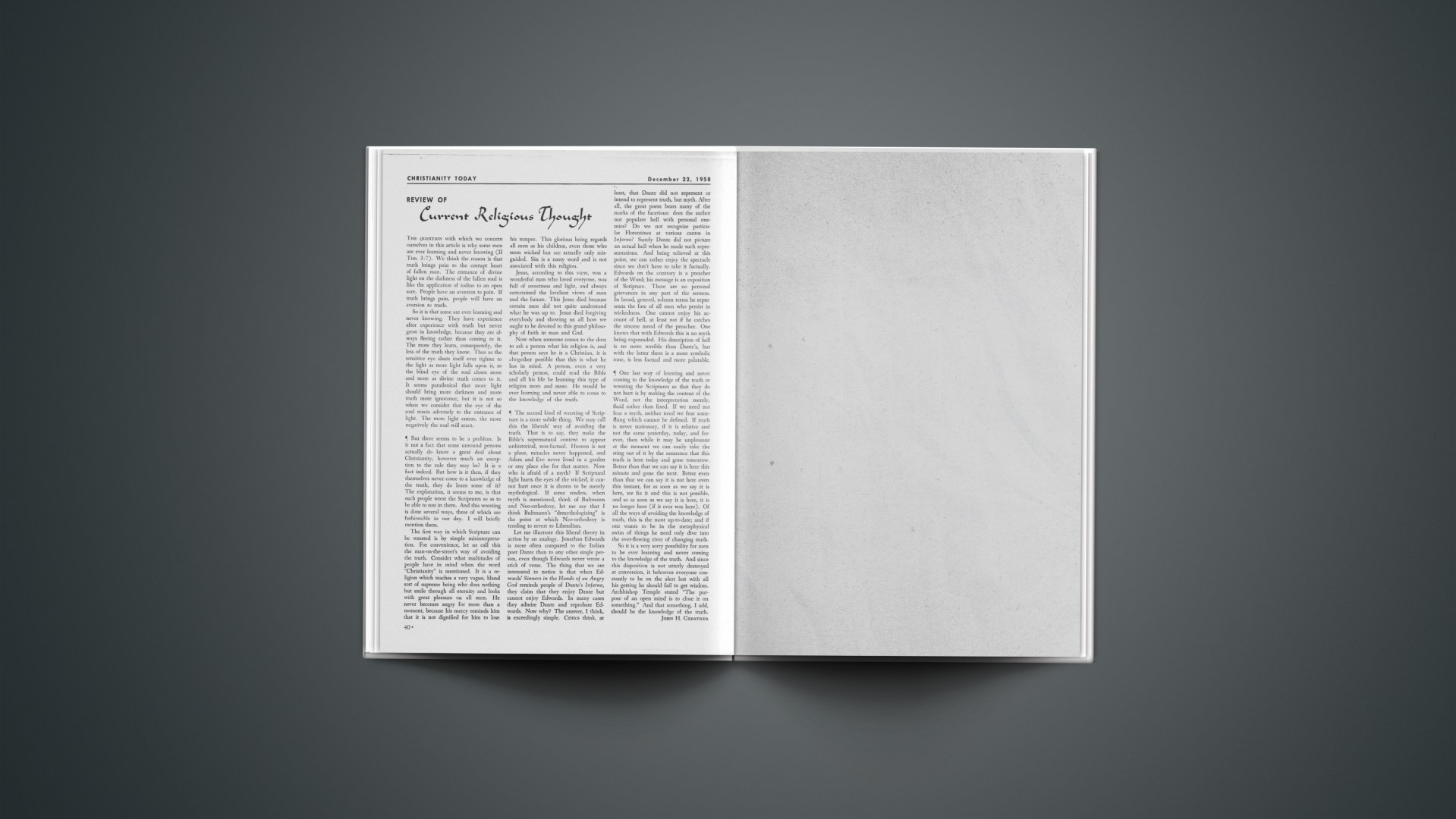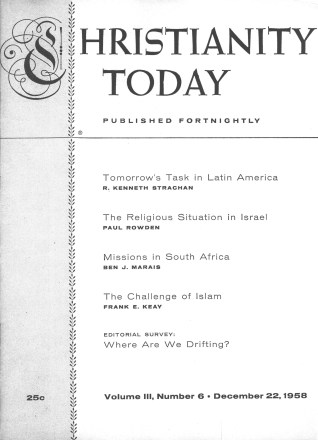The question with which we concern ourselves in this article is why some men are ever learning and never knowing (2 Tim. 3:7). We think the reason is that truth brings pain to the corrupt heart of fallen man. The entrance of divine light on the darkness of the fallen soul is like the application of iodine to an open sore. People have an aversion to pain. If truth brings pain, people will have an aversion to truth.
So it is that some are ever learning and never knowing. They have experience after experience with truth but never grow in knowledge, because they are always fleeing rather than coming to it. The more they learn, consequently, the less of the truth they know. Thus as the sensitive eye shuts itself ever tighter to the light as more light falls upon it, so the blind eye of the soul closes more and more as divine truth comes to it. It seems paradoxical that more light should bring more darkness and more truth more ignorance, but it is not so when we consider that the eye of the soul reacts adversely to the entrance of light. The more light enters, the more negatively the soul will react.
But there seems to be a problem. Is it not a fact that some unsound persons actually do know a great deal about Christianity, however much an exception to the rule they may be? It is a fact indeed. But how is it then, if they themselves never come to a knowledge of the truth, they do learn some of it? The explanation, it seems to me, is that such people wrest the Scriptures so as to be able to rest in them. And this wresting is done several ways, three of which are fashionable in our day. I will briefly mention them.
The first way in which Scripture can be wrested is by simple misinterpretation. For convenience, let us call this the man-on-the-street’s way of avoiding the truth. Consider what multitudes of people have in mind when the word “Christianity” is mentioned. It is a religion which teaches a very vague, bland sort of supreme being who does nothing but smile through all eternity and looks with great pleasure on all men. He never becomes angry for more than a moment, because his mercy reminds him that it is not dignified for him to lose his temper. This glorious being regards all men as his children, even those who seem wicked but are actually only misguided. Sin is a nasty word and is not associated with this religion.
Jesus, according to this view, was a wonderful man who loved everyone, was full of sweetness and light, and always entertained the loveliest views of man and the future. This Jesus died because certain men did not quite understand what he was up to. Jesus died forgiving everybody and showing us all how we ought to be devoted to this grand philosophy of faith in man and God.
Now when someone comes to the door to ask a person what his religion is, and that person says he is a Christian, it is altogether possible that this is what he has in mind. A person, even a very scholarly person, could read the Bible and all his life be learning this type of religion more and more. He would be ever learning and never able to come to the knowledge of the truth.
The second kind of wresting of Scripture is a more subtle thing. We may call this the liberals’ way of avoiding the truth. That is to say, they make the Bible’s supernatural content to appear unhistorical, non-factual. Heaven is not a place, miracles never happened, and Adam and Eve never lived in a garden or any place else for that matter. Now who is afraid of a myth? If Scriptural light hurts the eyes of the wicked, it cannot hurt once it is shown to be merely mythological. If some readers, when myth is mentioned, think of Bultmann and Neo-orthodoxy, let me say that I think Bultmann’s “demythologizing” is the point at which Neo-orthodoxy is tending to revert to Liberalism.
Let me illustrate this liberal theory in action by an analogy. Jonathan Edwards is more often compared to the Italian poet Dante than to any other single person, even though Edwards never wrote a stick of verse. The thing that we are interested to notice is that when Edwards’ Sinners in the Hands of an Angry God reminds people of Dante’s Inferno, they claim that they enjoy Dante but cannot enjoy Edwards. In many cases they admire Dante and reprobate Edwards. Now why? The answer, I think, is exceedingly simple. Critics think, at least, that Dante did not represent or intend to represent truth, but myth. After all, the great poem bears many of the marks of the facetious: does the author not populate hell with personal enemies? Do we not recognize particular Florentines at various cantos in Inferno? Surely Dante did not picture an actual hell when he made such representations. And being relieved at this point, we can rather enjoy the spectacle since we don’t have to take it factually. Edwards on the contrary is a preacher of the Word; his message is an exposition of Scripture. There are no personal grievances in any part of the sermon. In broad, general, solemn terms he represents the fate of all men who persist in wickedness. One cannot enjoy his account of hell, at least not if he catches the sincere mood of the preacher. One knows that with Edwards this is no myth being expounded. His description of hell is no more terrible than Dante’s, but with the latter there is a more symbolic tone, is less factual and more palatable.
One last way of learning and never coming to the knowledge of the truth or wresting the Scriptures so that they do not hurt is by making the content of the Word, not the interpretation merely, fluid rather than fixed. If we need not fear a myth, neither need we fear something which cannot be defined. If truth is never stationary, if it is relative and not the same yesterday, today, and forever, then while it may be unpleasant at the moment we can easily take the sting out of it by the assurance that this truth is here today and gone tomorrow. Better than that we can say it is here this minute and gone the next. Better even than that we can say it is not here even this instant, for as soon as we say it is here, we fix it and this is not possible, and so as soon as we say it is here, it is no longer here (if it ever was here). Of all the ways of avoiding the knowledge of truth, this is the most up-to-date; and if one wants to be in the metaphysical swim of things he need only dive into the ever-flowing river of changing truth.
So it is a very sorry possibility for men to be ever learning and never coming to the knowledge of the truth. And since this disposition is not utterly destroyed at conversion, it behooves everyone constantly to be on the alert lest with all his getting he should fail to get wisdom. Archbishop Temple stated “The purpose of an open mind is to close it on something.” And that something, I add, should be the knowledge of the truth.










